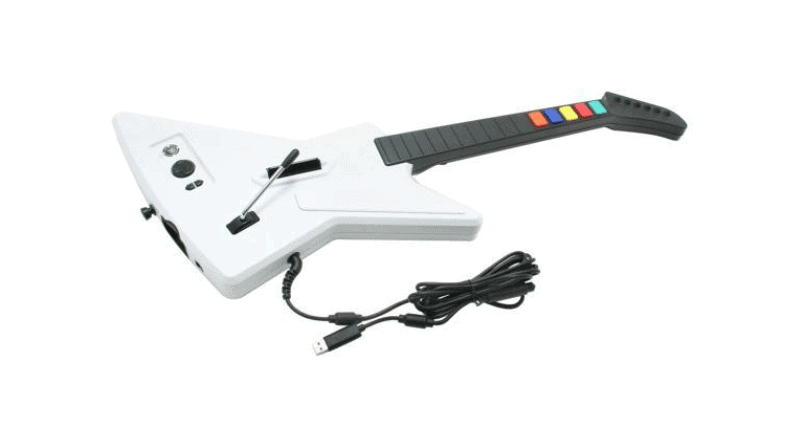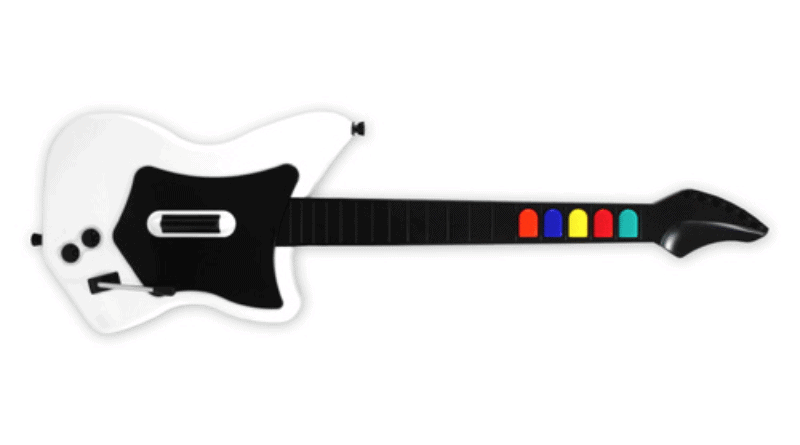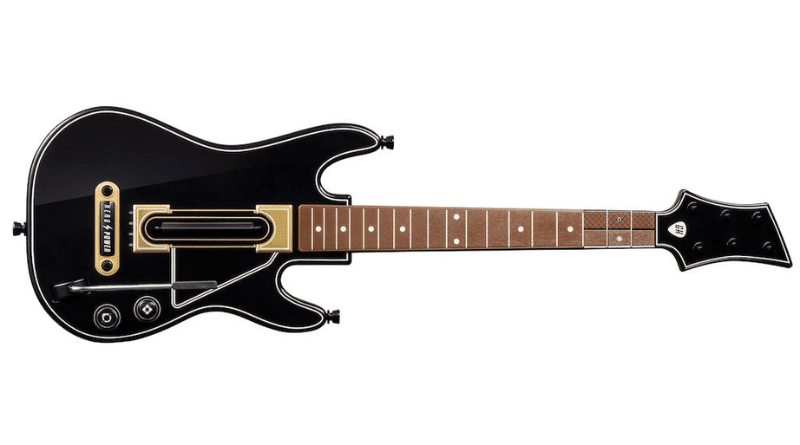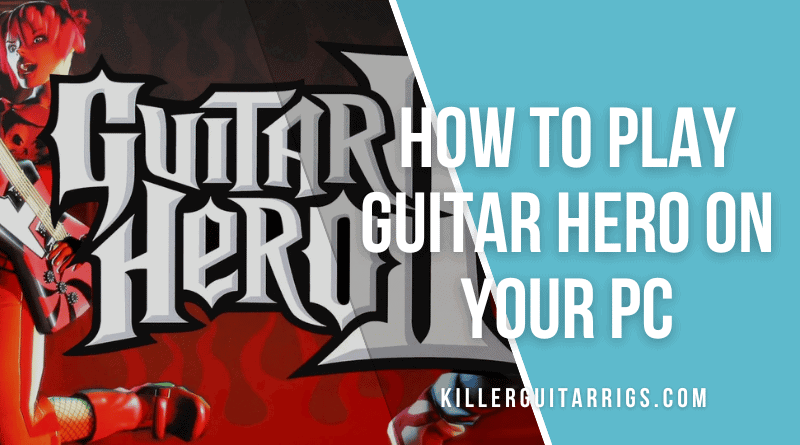Guitar Hero was an absolute smash hit upon its release, and has remained incredibly popular ever since, with 23 editions published between 2005 and 2015. Unfortunately, however, most versions were only ever released on console platforms like XBox and Playstation, meaning PC gamers had to either invest in a games console, or limit themselves to the 3 editions released for PC.
Since then, there have been some developments that now actually allow PC users to play any version of Guitar Hero on PC. The transition from console to PC gaming has been a defining trend in the world of video games, and the game’s community is a prime example of this shift thanks to dedicated fans of the series and platforms like Clone Hero.
In this KillerGuitarRigs Guide we’ll be looking at the methods you can use to play the game on a PC, including any software you need, as well as any hardware.
If you’ve always wanted to play Guitar Hero on your PC, you won’t want to miss this!
Contents
- Is it Possible to Play Guitar Hero on PC?
- The Popularity of Guitar Hero
- How to Play Guitar Hero Using an Emulator
- Official PC Versions
- How to Install Guitar Hero on your PC
- Which Guitar Hero Controllers are PC Compatible?
- How to Connect a Guitar Hero Controller to a PC
- Clone Hero: A Community-Driven Platform
- The Future of Guitar Hero on PC
- Final Thoughts
Is it Possible to Play Guitar Hero on PC?
Yes, it is possible to play Guitar Hero on PC, but it does require a little work – you will need a compatible controller, and a copy of the game. There are tons of emulators that will allow you to play any version of the game on your PC, but the best way to play is using a genuine copy – Guitar Hero III: Legends of Rock, Guitar Hero: Aerosmith, and Guitar Hero: World Tour were the only versions of the game officially released for PC.
If you aren’t worried about playing in career mode, Clone Hero is probably the best fan made GH style game out there, and the best part is that it’s free.
The Popularity of Guitar Hero
Guitar Hero has become so much more than a video game series to millions around the world. It’s been featured in movies, books, and has inspired countless gamers to take up the guitar for real.
It has had a significant cultural impact, and has transcended both music and gaming, becoming a recognizable part of pop culture. Show someone a GH controller and we can all but guarantee they’ll know the name of the game it belongs to!
It’s no surprise that it’s such a well known franchise. By early 2008, the franchise had exceeded $1 billion in North American sales alone, with over 16 million copies sold, and that doesn’t even include downloadable content or games.
A little over a year later in 2009, the game’s worldwide sales had hit the staggering amount of $2 billion, becoming the third biggest video game franchise on the planet behind the Super Mario games and the Madden NFL series. By this point, it was in over 15 million individual households.
The game’s popularity has extended beyond at home gaming, too – there are GH competitions held both online and in person around the world, some with significant prize money available. Even in more informal settings, bars and pubs often host Karaoke style GH nights.
As briefly mentioned earlier, the game has also inspired millions of children to learn real musical instruments. A March 2012 study by the British Journal of Music Education found that games like GH help to develop real musical skills, and that at minimum, they made the idea of learning how to play instruments for real more appealing to a majority of kids.
Another study, by the UK group Youth Music, actually found that 2.5 million out of 12 million children in the UK decided to pick up and learn real instruments again, after they’d played GH and similar games – truly remarkable statistics.
How to Play Guitar Hero Using an Emulator
We will preface this section by pointing out that using emulators and unofficial ROMs may result in damage to your PC. You should be aware of the dangers of downloading files from unverified sources before downloading and installing such software.
In addition to the obvious risks that come with downloading these files, emulator ROMs are often sluggish performance-wise, and won’t offer the same kind of experience you’d find on an official copy of the game, or fan made freeware.
If this is the path you’re taking, we’d suggest looking at RPCS3 as a relatively reliable emulator. This is a PS3 emulator, and works with Windows, Linux, and MacOS. If you’re going to use this emulator, we can’t stress enough that you should only ever download it from the official website.
You’d then Google for the ROM of the specific edition of GH you’re looking to play, and open it with the emulator.
Official PC Versions
Guitar Hero was a multi platform game, and has seen several PC compatible versions released since the initial console launch of the original, although not every version had an official Windows release.
While it’s technically possible to play any version via an emulator, these are the three official PC games from the series you can purchase and install.
Guitar Hero III: Legends of Rock
Although Guitar Hero III: Legends of Rock was the third game in the series, it was the first official PC release of the game, and still remains one of the most popular. It was developed by Neversoft and published by Activision, and was released back in 2007. Legends of Rock introduced an new online multiplayer feature, which allowed players to face off against others from around the world in “Guitar Battles”, and also featured a co-op career mode
As with previous versions, players had the option to play either the lead guitar, bass, or rhythm guitar parts – allowing up to 3 players to play cooperatively like a real band. Even for those who didn’t play cooperatively, it added additional tracks to learn for the 70 plus included songs, significantly expanding the gameplay.
One of the coolest things about this version was the inclusion of big name guitarists like RATM’s Tom Morello and GnR’s Slash as guitar battle opponents and as playable characters.
It was widely regarded as the most challenging of the series, and as a result became the best selling game of the year, receiving widespread critical acclaim, with an 8.9/10 from IGN, 8/10 from Gamespot, and 5/5 from Common Sense Media.
Guitar Hero: Aerosmith
The series has spawned a number of mid cycle artist edition spin offs and expansions, including Guitar Hero: Aerosmith, which is the only such title to have been officially released on PC. The launch came a few months after the various console releases, with copies hitting the shelves in October 2008. This was the final version of the game that featured only guitar and bass parts.
Interestingly, this version wasn’t all Aerosmith, with 11 of the 25 included songs coming from other artists. Because this version was an expansion for Guitar Hero III: Legends of Rock, the gameplay was identical, including the career mode and co-op features.
One of the coolest things about this Aerosmith edition was that the career mode actually followed the band’s career and history, with the track choices being inspired by real gigs and shows that the band have performed in from their first concert at Nipmuch High school, to the Super Bowl Halftime show, and their legendary Moscow performance. It features interviews and band trivia, making it a really cool option for true Aerosmith fans.
Because of the limited track list, it didn’t perform as well as its parent game in the reviews, but still provided some new content for those who had already finished Legends of Rock.
Guitar Hero: World Tour
Guitar Hero World Tour, was the follow up to Guitar Hero III: Legends of Rock, and was released in November 2009, about a year after the Wii, Xbox, and Playstation releases. This was the most hotly anticipated version of the game to date, largely due to the inclusion of drum and microphone controllers, which truly allowed players to experience playing in a full band.
World Tour also introduced the “Music Studio” mode, which allowed players to create and share their own songs.
Obviously besides the addition of the drum and microphone controllers, the gameplay was just about identical to the previous versions – the biggest change in this respect was the ability to play additional notes while holding a sustained note on the guitar.
Like Legends of Rock, it featured a career mode, which could be played on all of the instruments, and a band career mode for co-op play.
The drum controller and microphone additions were a massive success, and take most of the credit for the popularity of the game, which can still be purchased brand new from numerous retailers.
How to Install Guitar Hero on your PC
If you’re planning to use an official copy of the game, installation is a really straightforward process – simply insert the disc into the CD drive on your computer, and follow the installation prompts.
The specific process will vary slightly depending on what version of Windows you’re using, but the installation wizard should run automatically in any case.
Which Guitar Hero Controllers are PC Compatible?
There were never any PC specific guitar controllers made for the PC versions of the game, that being said, there are several controllers, both officially licensed and 3rd party manufactured, that work perfectly on this platform.
The PlayStation 3 controllers that came with GH 1, 2, and 3 all came with a USB cable as well as the proprietary PlayStation connection. These tend to be the best options as they don’t suffer from latency issues.
If you have a wired controller that features a PS2 style connection, a PS2 to USB adapter is a cheap solution. They are readily available on Amazon, and are dirt cheap. If you have an Xbox type wired controller, you’ll need a slightly different adapter.
Later versions of the controller, including the latest GH Live version, came with Bluetooth connectivity. This is great if you don’t want to be tethered to your PC, but as mentioned, latency can become a real issue.
Wireless controllers can be a little more tricky to set up, and will require the purchase of a wireless USB dongle.
How to Connect a Guitar Hero Controller to a PC
The instructions will change slightly depending on which type of controller you’re using.
Wired Controllers

The first step is to plug your controller into a USB slot on your PC. If the controller you have has a console connection rather than a USB, be sure to use your converter. Windows should automatically detect the control device and attempt to install the requisite drivers.
Once the drivers are installed, it’ll be ready for use as soon as the software is up and running.
Wireless Controllers

With a wireless controller you’ll need a USB dongle plugged into your PC before you start. Most wireless controllers come with a dongle in the box. If you bought yours used and there was no dongle included, then you’ll need to buy one before starting.
The dongle may or may not automatically trigger a driver download. If it doesn’t, check to see if the controller came with a disc – the drivers are likely to be on there. Otherwise, check the make and model, then search for the drivers online.
Again, when the drivers are installed, the controller should work without any additional input.
Bluetooth Controllers

Bluetooth Controllers, like the one that comes with Guitar Hero Live will connect via Bluetooth as long as you have a Bluetooth enabled PC. If this is the case, turn on the controller, ensure that your PC is able to pair with new devices, and push the sync button on the guitar.
If successful, you’ll see the controller in the list of Bluetooth devices on your PC.
Clone Hero: A Community-Driven Platform
As mentioned earlier, there were only 3 official versions of the series released for PC, which led die hard fans looking for new challenges to create their own versions – there are several available, but Clone Hero has been the most successful by far.
Clone Hero is a freeware game, developed by Ryan Foster. It started as a small project in 2011, and was originally named GuitaRPG. It underwent several changes, including a name change to Guitar Game, before becoming Clone Hero. The game’s Alpha release was on March 1, 2017, with the full release coming some time later on November 29, 2022.
Being a clone of Guitar Hero, the aesthetics are incredibly similar to the original game, and the gameplay is almost identical, made possible after the game shifted from the XNA engine with simple 2D graphics to the Unity engine with more advanced 3D graphics.
The biggest appeal of Clone Hero to the PC gaming community over playing old versions of the game is the ability to play community made songs. The massive fanbase has resulted in thousands of titles being made available, and a huge boost in popularity for this genre of games in general.
One of the biggest differences between Clone Hero and Guitar Hero is the approach to song selection. GH titles ship with a set group of tracks, and on some versions, additional songs can be downloaded. With Clone Hero, any audio file can be converted into a Clone Hero Chart. This effectively means that you can play literally any song you want on Clone Hero, including novelty and non musical tracks.
Because the song charts are community made, the difficulty of the tracks is entirely down to the users who create the files. This has resulted in songs with some frankly brutal difficulty levels that far exceed the difficulty of the standard GH songs.
How to Install Clone Hero on your PC
Besides the official GH games for PC, our favorite way to get a GH style fix is to use Clone Hero. This is a free GH style game that doesn’t require emulators or downloads from potentially nefarious sources.
Not only is Clone Hero a safer option, it also allows you to use any song you like. No longer will you be limited to the game’s standard selection!
To install Clone Hero, visit their website, and download the latest version from the home page. The link to their Discord server is also featured on the home page, and it’s a great place to get involved in the growing Clone Hero community.
When you click download, you’ll see some download options, with Windows 64 bit as the standard choice. If this isn’t compatible with your system, click “Can’t find your operating system?” for more choices.
The download package will include a 7z compressed file, which you’ll need to open with an extraction tool like WINRAR. Move the extracted folder to a location of your choice.
When the folder is in the desired location, open it, and create a new folder inside, and call it “songs”. This is where you’ll save songs to.
There’s a ton of pre formatted songs available from the below link. The Discord channel is another great resource
Download any songs you’d like to play, and save them to the songs folder you created earlier. You’ll then need to open the Clone Hero game, proceed to settings – general – scan songs. This step will ensure that the game detects any songs you’ve downloaded.
From there you’re good to play! Clone Hero is compatible with practically any guitar controller, including GH models, and even those from the competitor, Rock Band.
Clone Hero Controller Compatibility
Clone Hero supports keyboard controls, gamepads (like Xbox or Playstation controllers), guitar controllers, and drums (both gamepad style and MIDI style) as long as they have a USB out and are PC compatible.
Even though there’s a wide range of compatibility, the controllers that work best for Clone Hero are the Gibson Explorer style guitar from Guitar Hero 5, the Les Paul style guitar from Guitar Hero III: Legends of Rock, as well as any of the guitar options available with Guitar Hero: World Tour (including drums).
These particular controllers are the easiest to set up, and generally result in the best gameplay experience. The original controllers are typically available as standalone used items on eBay and Amazon (if you’re lucky you might even find new ones). Gamestop is also worth checking out to find used controllers. A word of caution – it might be tempting to buy brand new aftermarket copies from the likes of Temu, DHGate, Aliexpress or even Amazon, but there are tons of reports of poor quality, and hit or miss compatibility.
Of course, a used controller will be much cheaper, particularly if you find it somewhere like a thrift store. Look to spend no more than about $30 for a guitar, or $70 for the drums. If you find a brand new original controller, you’ll probably find that they sell for a premium, so unless you’re dead set on buying new, we’d suggest looking at used controllers.
You’ll also need to consider the additional cost of dongles for wireless guitars, or breakaway cables for wired ones. If you want to use a Wiimote controller, you’ll need to download WiitarThing, a piece of software required to install the necessary controller drivers on your PC. As with any freeware, it’s essential to stick carefully to the setup guide, especially when updating from older versions .
Customization and Modding
One of the best things about PC gaming in general is the ability to modify and customize games, and this translates directly to Clone Hero, too. Of course, Clone Hero is best known for its ability to create a chart from any audio file, but the game also allows players to modify and enhance various other aspects, from graphic changes like custom note highways and skins, to actual gameplay tweaks, making Clone Hero ideal for anybody who wants a truly bespoke gaming experience.
These customization options result in a game that always feels fresh, and offer a unique experience for every player.
Where to Find Songs
If you’re not into the idea of making your own Clone Hero songs, you’ll be pleased to know that there are thousands of community made charts available for download. A quick Google search will result in a number of reliable sources, but the ones we’ve used include Rhythm Gaming World, Chorus, and Reddit. As with any PC download, there’s a risk of viruses, spyware, or malware infecting the files, so make sure your antivirus is up to date, and only download from trusted sources.
Once you’ve downloaded your charts, you’ll need to install them on your copy of Clone Hero. To do so, place them in the specific folder in your Clone Hero directory. The game should automatically detect these files and add them to your playable library. This process allows players to continuously expand their song collection, keeping the game fresh and exciting.
The Future of Guitar Hero on PC
With the incredible success of the series across all platforms, it’s a genuine surprise that the game was discontinued. Although the final version of the game, Guitar Hero Live, experimented with an entirely new first person gameplay format, something that the community has almost unanimously agreed was a bad choice.
The online community for the game has been speculating for years about a reboot and refresh of new games in the original franchise format, but to date, Activision Blizzard is yet to make any official statements about whether a new title is (or will be) in the works on PC or any other platform.
For now, at least, it seems that Clone Hero is the future of rhythm games on PC.
Final Thoughts
The Guitar Hero series of games are undoubtedly some of the greatest video games of all time. Not only are they fun to play, but they’ve inspired countless gamers to pick up real guitars and get started in music as a result. Not only that, but the sense of community that has developed around this game (and its copies) is really incredible, and because there has been such huge involvement in making it PC accessible, you don’t even need a games console to enjoy.
The steps to playing the game on PC are pretty straightforward, especially if you’re using official copies of the game and the associated peripherals. If you decide to go with an emulator, be sure to scan any files for malware before opening, and be aware that there’s a good chance you’ll suffer from reduced performance. Again, if you’re not going for an actual copy of the game, we recommend Clone Hero as the best free option.


